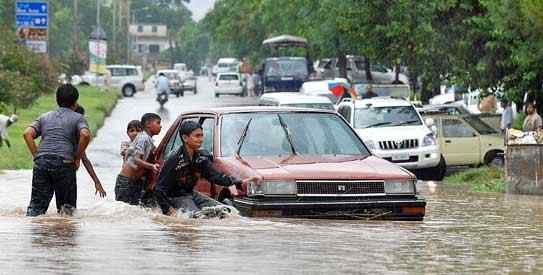ISLAMABAD – Pakistan’s National Disaster Management Authority (NDMA) has issued a fresh warning of intense rainfall across Punjab and Islamabad from September 1–3, raising fears of worsening floods in already-devastated regions.
The National Emergencies Operation Center (NEOC) said heavy to very heavy rain is expected in several districts, including Murree, Rawalpindi, Jhelum, Attock, Mandi Bahauddin, Gujrat, Gujranwala, Hafizabad, Chiniot, Lahore, Sialkot, Narowal, Sheikhupura, and Faisalabad. Southern and western Punjab districts—such as Sargodha, Bhakkar, Layyah, Mianwali, Dera Ghazi Khan, Sahiwal, Multan, Bahawalnagar, Bahawalpur, and Rahim Yar Khan—are also likely to be impacted.
Authorities are closely monitoring water levels at Head Marala, where rising flows could heighten flood risks downstream.
Emergency Preparations and Safety Advisory
Local administrations have been directed to prepare drainage systems, mobilize heavy machinery, and strengthen embankments in vulnerable areas. Residents in low-lying zones have been urged to stay alert, avoid unnecessary travel, and steer clear of submerged roads and bridges.
The NDMA has also called for strict adherence to safety guidelines, warning that torrential rains could quickly overwhelm infrastructure.
Meteorologists Warn of Severe Urban Flooding
The Flood Forecasting Division (FFD) in Lahore said a strong monsoon system over northwest Rajasthan and a westerly trough across northern Pakistan are fueling the current weather pattern. Heavy to very heavy rainfall is expected over the upper catchments of the Sutlej, Beas, Ravi, and Chenab rivers, as well as parts of Lahore, Gujranwala, and Gujrat divisions.
The FFD cautioned that the downpours could trigger very high river flows and urban flooding in major cities.
Devastation So Far: Millions Displaced, Hundreds Dead
Punjab remains the hardest-hit province, where flooding has already submerged more than 2,200 villages and forced the evacuation of 750,000 people, according to Provincial Disaster Management Authority (PDMA) Director General Irfan Ali Kathia. At least 33 people have died in recent days, adding to a nationwide death toll of over 840 since late June.
The scale of destruction has been catastrophic: millions have been affected, with widespread damage to homes, crops, and roads.
Political Tensions Over Indus Waters Treaty
Amid the disaster, Islamabad has raised concerns over India’s handling of the Indus Waters Treaty, accusing New Delhi of failing to provide timely flood warnings. This has fueled criticism that regional water-sharing disputes are compounding Pakistan’s vulnerability to extreme weather events.

